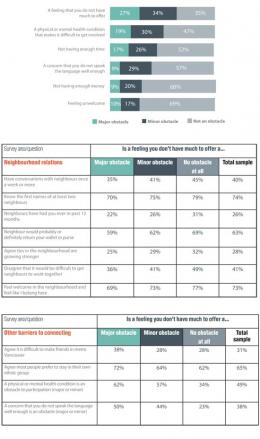When we feel we have nothing to offer

One of the most surprising findings from our Connections and Engagement Survey came from a question that we thought we knew the answer to.
We asked people what prevented them from participating in activities that could make their neighbourhood a better place to live.
We thought that not having enough time might top the list. But it did not. The reason people gave most often — the major obstacle to participating more fully in neighbourhood life — was the feeling that they did not have much to offer.
Understanding those who feel they have little to offer
As a community foundation, we are concerned that 27 per cent of survey respondents say a major obstacle to participating in neighbourhood life is a feeling that they have little to offer. Another 34 per cent say this is a minor obstacle.
This means that 61 per cent of the people we surveyed have little confidence that they have much to contribute to neighbourhood life. We believe this is a significant finding.
We wanted to learn more about what is associated with the feeling of not having much to offer and what might be contributing to it.
Demographically, the people who reported feeling they do not have much to offer are likelier to be younger (in the 25 to 34-year-old age range), women, and people with higher levels of education and income.
Weaker neighbourhood relations and lower trust
Our analysis shows that the people who feel they do not have much to offer are less connected to their neighbours. They are more pessimistic about their neighbours’ capacity to solve local problems. They believe there is lower trust among neighbours. And they are more skeptical that a neighbour would return a lost wallet or purse.
They are also less likely to know their neighbours’ names, to have conversations with them or to be invited over to a neighbour’s home.
As well, they are less likely to feel welcome in their neighbourhoods and less likely to think that the ties among their neighbours are growing stronger.
Our survey showed that there is a strong link between neighbourhood connections and trust, optimism about community, and social cohesion.
The people who say they have little to offer are less connected to their neighbours, and it may be that the hardening of community attitudes that comes with disconnection at the neighbourhood level may be affecting their confidence that they can get involved in a meaningful way.
Greater sense of isolation
People who feel they do not have much to offer may also have experienced more social rejection than others. They are more likely to agree that it is difficult to make new friends in metro Vancouver. They are also more likely to think that people tend to prefer to stay within their own ethnic group.
People who feel they have little to offer are also more likely to cite a physical or mental health condition and language issues as barriers to participation. Their greater likelihood of coping with a physical or mental condition that prevents participation, and their heightened concern about their ability to speak the language may make them more sensitive to feelings of rejection or diminish their confidence about their contributions.
Our Connections and Engagement Survey found that participating in neighbourhood activities is associated with some important foundations of community engagement, including trust and a sense of belonging.
It should be of concern to all community organizations, governments, school boards and anyone interested in building healthy, vibrant, livable communities that such a large proportion of the population in metro Vancouver is not engaged in community because they do not think they have much to offer.
Leave a comment









